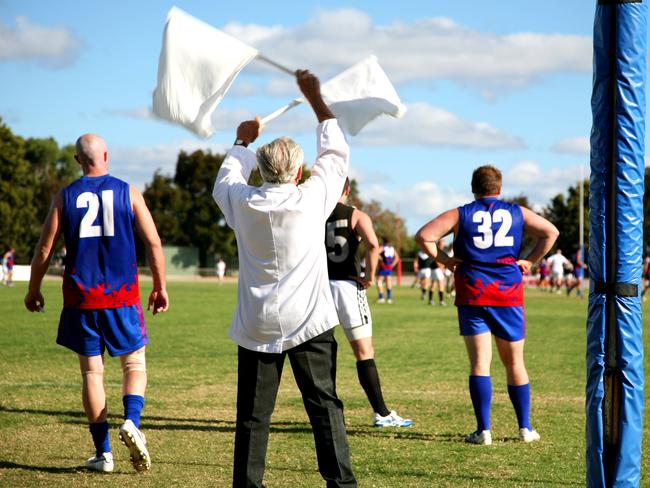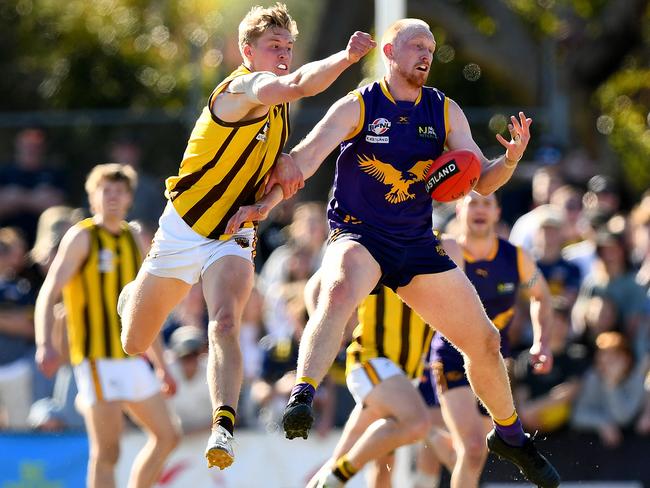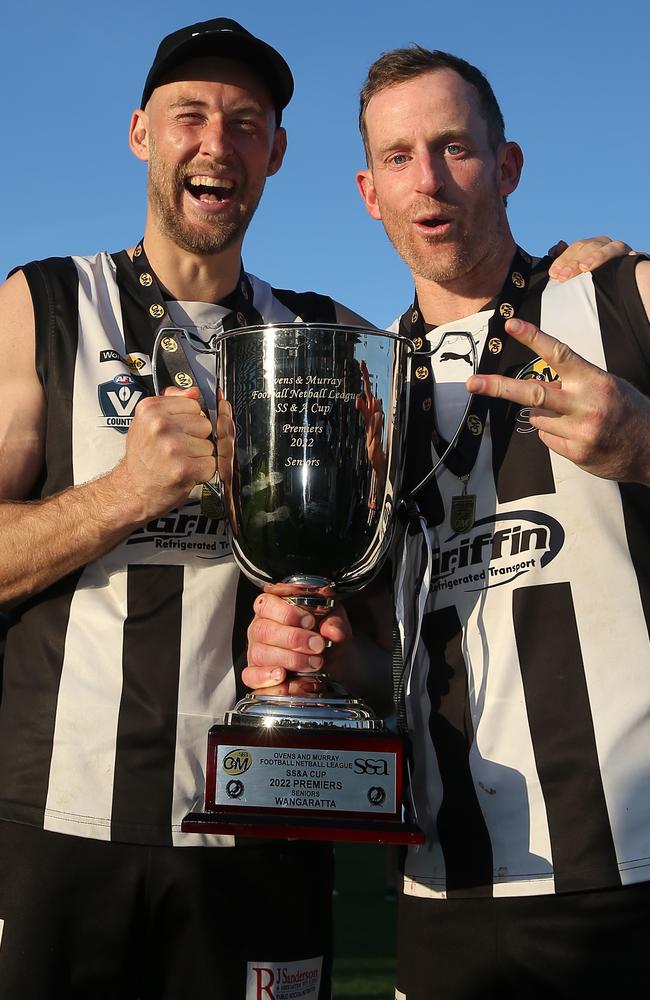Stories of under-the-table deals abound but AFL Victoria is adamant that the salary cap is here to stay in community football
“Out of control.” “Free for all.” Local footy insiders shine light on the big-money deals fuelling a salary cap rorting epidemic.

AFL
Don't miss out on the headlines from AFL. Followed categories will be added to My News.
Everything was going well between the country club officials and their prospective recruit.
They had taken the player out for a Sunday lunch and talks were progressing smoothly about the 2024 season.
That was until the discussion got down to money.
The officials wanted the former AFL player, but not at the price he wanted: $80,000 for the season.
As one of the officials points out, it “doesn’t leave much for the other 21 players’’.
But apparently the ex-league man had been offered the same sum by a club in another major country competition.
The story is doing the rounds in the Gippsland region, again putting the spotlight on salary caps in Victorian country and suburban leagues.
All leagues, including the non-affiliated Picola District, have payment ceilings.
But many people involved in local football say the cap is failing to curb the sort of spending that prompted alarmed administrators to introduce it in the first place.
One senior coach tells how one of his players was offered $60,000 last year to cross to a district league.
The player was dazzled, even overwhelmed, by the financial incentive but ultimately declined it.
The same coach now has a battle to keep a handy type being tempted by an $850-a-game offer by a club in a surrounding league.

Similar stories are getting around suburban football, about how much players are wanting, how much clubs are giving and how little is done to ensure compliance of the cap.
Upfront, sign-on cash payments remain one of the most common methods to avoid reporting the true amount players get paid.
A midfielder with VFL experience is rumoured to be receiving $50,000 to play local football next year.
Another ex-state league onballer apparently receives $2,500 per game. If it’s true, he doubtless goes on the official books at a far lesser figure.
There are other ways to pay, from gambling vouchers, fuel cards and overseas trips.
In a conversation with CODE Sports this year, a Division 1 suburban coach scoffed at the suggestion clubs in his competition were staying within the salary cap.
He said his own club had taken the view that “if you can’t beat ‘em, you might as well join ’em’’ in paying under the table and over the cap.
“We had this big bloke we really wanted and needed. A club 10 kilometres down the road really wanted and needed him too. He played us off against each other. I knew that. We had to give him a sign-on of $9,000,’’ he said.
“Know the funny part? He wasn’t that good, let me tell ya.’’
He said clubs had little fear of being caught because the salary cap was almost impossible for leagues to police.
It was essentially an honour system, he said, and plenty of clubs weren’t being honest.
At the mention of the cap, a much-decorated senior coach who finished up last year says with a laugh: “What salary cap? What are you talking about?’’
He believes most of the first division sides he coached against in 2022 were “way over’’ the ceiling, estimating that even the bottom team was spending about $160,000.
“It’s out of control. AFL Victoria needs to make it easier for themselves. You can’t put rules in place that can’t be policed,’’ he says.
“My honest opinion? There would be 50 per cent of clubs going over. Five years ago, it wasn’t so bad. Now it’s a free-for-all. Some of them are taking the piss.’’
The former coach also makes the point that player payments and the administration of the cap are putting pressure on volunteers.
“Clubs are losing really good people because of it,’’ he says.

Legendary former Balwyn president Richard Wilson is happy to go on the record about the salary cap, which was significantly reduced when football was coming out of the Covid-19 pandemic.
In the Eastern league, it initially dropped from $220,000 to $100,000. Next year it will be $120,000.
Wilson believes the player-payments limit should be scrapped.
He says it doesn’t and hasn’t worked.
“Covid in part gave them (AFL Victoria) an opportunity to cut it back, but we’re no longer in Covid,’’ Wilson says.
“Given that you can’t police and govern and audit every club in Victoria … without those controls, it’s become evident it’s a meaningless exercise of trying to provide sustainability to clubs.
“If you’re going to have it, every club in every division has to be audited every year, not just the premiers or the teams that make the top two or three. And that’s not going to happen. So whatever they wanted to achieve has failed.”
The salary cap operates in conjunction with a points cap in which players are graded on the level of football they have played.
The former suburban coach says the points system is “perfect’’.
“You can’t cheat it,’’ he says. “It’s there in black and white. And you can’t go over it. That’s the one thing that works in trying to even up comps.’’
Not only is it transparent, he says, it encourages clubs to develop their own players and take the rewards with one-point classifications.

But, declaring he believes in a “free market’’, Wilson argues the case against the points cap too.
He says it restricts player movement, “restricts players from going to where they want to play, particularly at the higher levels of metropolitan football’’.
“At those higher levels, there’s no doubt the standard of football has diminished dramatically, because the quality of the players has diminished. You talk to some of the older guys. They watch the games and they all say, ‘These guys wouldn’t have got a kick’.
“This notion that it will drive players to return to their home clubs, where they’ve come through junior programs, is nonsense. If you went through the TAC Cup system or the VFL or even the AFL, you might not be living where you played junior football, the mates you played with in junior football might not be still playing anyway and if the club’s playing divisions two, three or four, and you want to play Premier Division, you’re not going to go back.
“In the meantime you’ve got a whole raft of players coming down from the bush for all different circumstances in their lives and they’re being penalised for wanting to go to a club where their employment options might be enhanced or the culture is great or they know some blokes. The points (cap) just doesn’t cut in that regard.’’
AFL Victoria believes the salary cap is working.
It says some clubs were spending upwards of $350,000 before the “community club sustainability program’’ was introduced and player payments were reaching unsustainable levels for many leagues and clubs.
“We still have some way to go in educating players and some stakeholders about payment demands, but there has been a strong level of acceptance that it’s been a good move for community football,’’ AFL Victoria community football manager John O’Donohue said in reply to a series of questions from CODE Sports.
“We are seeing pressure being applied by some clubs to increase the caps in some leagues after a reset during Covid and this is an ongoing discussion and debate as to what is the sustainable and appropriate level.’’

The Ovens and Murray league, which is heavily populated with former AFL players, took the unprecedented step of stripping Wangaratta of its 2022 premiership when AFL Victoria’s penalties for the cap breach stopped short of removing the flag.
Chairman David Sinclair says the cap should stay and not leave the player points system as the sole mechanism for equalisation.
“Some would say the salary cap rules are not having the impact on equalisation that was hoped, but it has ensured that clubs are trading more responsibly,” he says.
“In no way condoning third-party payments or gifts, but if they’re in the market, committees and boards aren’t responsible for raising the funds to pay players like they once were.
“Before the cap and points coming in it was left to volunteers to raise the funds to keep up with the market to remain competitive.
“This was burning out volunteers and driving clubs to insolvency.
“In many ways, it’s saved clubs from themselves.”
Gippsland club official Michael Henderson has put forward to AFL Victoria an amnesty-type approach for clubs that find themselves in the crosshairs of a cap breach investigation.
“A strategy to ensure an effective and efficient investigation is to offer any club under investigation an opportunity to provide details of any deliberate or inadvertent salary cap breaches upfront,” he said.
“The incentive for these clubs would be lighter, yet still severe, sanctions than otherwise would be imposed.
“Clubs would be on notice that once the upfront opportunity passes, should the investigation unearth anything not initially disclosed the penalties would increase dramatically.”
Henderson’s view is that if the salary cap is to remain, it must be properly enforced.

Like Sinclair, Southern league CEO Lee Hartman supports the player-payments cap.
He highlights that AFL Victoria has put more money into policing and all leagues will be doing audits of the grand finalists in every division.
Hartman believes most clubs play by the rules.
“The majority of clubs do the right thing. I’m sure there are a few rogue clubs, but with this step-up in the audits, where both clubs and players will be on the hook, I think it will start to straighten out a bit,’’ he says.
“I think it goes hand-in-hand with the points system. Some people say the points system is enough but I disagree. We don’t want community clubs going broke by having an open chequebook.’’
Hartman believes clubs found to have exceeded the salary cap should receive harsh penalties.
In the past, he says, they have been “hit with a feather-duster’’.
“They should be whacked harder in my opinion … anyone knowingly breaching the rules should be hit hard,’’ Hartman says.
“Sometimes there might be an administrative error and education can come into it. But when it’s done deliberately, we need to go hard to set strong precedents.’’
The salary cap and player points system were introduced in 2016.
O’Donohue says a team of compliance officers has been recruited to complete the grand final team reviews and will remain in their roles in the new year “to ensure all clubs are supported and compliant with the program”.
The AFL’s former salary cap cop, Ken Wood, has been appointed to oversee the grand final reviews and the compliance and integrity teams.
“Ken is the former AFL salary cap manager and comes with extensive experience in the management of player payments and adds significant credibility to the program,” O’Donohue says.
He says there are no plans to dump the salary cap and leave the player-points system as the sole means to achieve equalisation across leagues.
“Evidence and feedback received suggests that the two programs are most effective working in conjunction,” he said.
“There are many scenarios where points can be low, salary cap high and vice-versa.
“The objective of capping and restricting the top team from getting further ahead is best served with both.
“Player points and salary caps are designed to help volunteers and local community clubs as they are often responsible for raising funds and this puts pressure on the system and transfers to volunteers, who are the lifeblood of clubs.’’
More Coverage
Originally published as Stories of under-the-table deals abound but AFL Victoria is adamant that the salary cap is here to stay in community football




